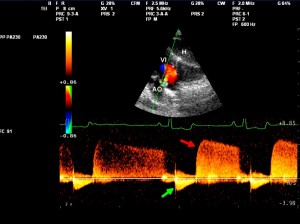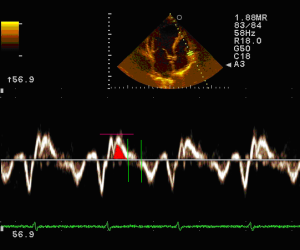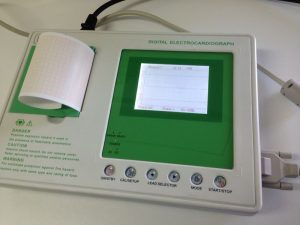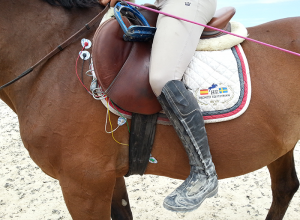Cardiology in Horses
Echocardiography in horses

Cardiology in Horses – Echocardiology
This technique applied to horses is very useful and simple, non-invasive in the chest wall is done by means of a sparse ultrasound to produce images in two dimensions. Currently in horse cardiology, the mode is the most used 2D, it allows us to see the images in real time and two-dimensional (flat cuts of the heart in different axes). Also, it can be complemented with other techniques such as Doppler.
DOPPLER. Depending on the frequency difference between the emitted and the reflected ultrasound, the speed and direction of the moving object can be calculated (Doppler effect). This will make it easier for us to study the blood flow within the heart.
There are several types of pulsed Doppler, multiple doors and color flow. We use it to locate the possible reflux of blood.
Echocardiography is indicated as a diagnostic technique for the non-invasive image to which it provides information about a large number of parameters such as being; the shape, size, and function of the heart valves, the pericardium, or the coronary arteries and veins.
It is also used to detect alterations or defects in the walls, as well as for the shape and function of the heart valves.

Cardiology in Horses – Ecocardiology
Basically the use of ultrasound in the heart, has the following clinical applications:
- Heart Valves
- Congenital heart disease
- pericardial effusion
- Cardiomyopathy
- Ischemic heart disease
- Aorta disorder.
Electrocardiogram in horses
The electrocardiogram (ECG or EKG) in cardiology in horses is a test that records the electrical activity of the heart by means of a graphic representation of the cardiac contraction, through digital electrodes that amplified and recorded on a screen of a computer or mobile phone the heart and thus detect possible cardiac disorders.
In horse sports medicine it is useful for:
• Know the regularity of the heartbeat.
• Study the effect of certain medications on the rate of pulse transmission or cardiac contraction in sports horses.
• Know the size of the cameras or the variation in the thickness of the walls of the heart.
• Detects possible heart injuries. • Use to diagnose myocardial damage.
• Differentiate a small infarction • Detect arrhythmias.
• Basically any alterations of the electrical activity of the heart. • Evaluation of the causes of heart failure.
• An ECG is useful to diagnose a heart disease that leads to poor perforation.

Cardiology in Horses

Holter electrocardiogram in horses
The Holter electrocardiogram on horses or the Holter monitor on horses is a very portable device that records and stores the electrical activity of the horse’s heart and can record your heart rate continuously for 24 hours. Currently widely used in cardiology on horse
The placement and use of Holter is imperceptible and painless. These are very easy-to-use veterinary horse electrodes, which are small adhesive patches in the chest area of the standing horse. The electrodes are connected to a recording monitor, which works by battery power.
The Holter is attached to the frame strap without causing discomfort in the development of the normal life of the horse.
While using the Holter monitor, it will record cardiac electrical activity and a person should keep a journal of the horse’s activities during the review period.
The different utilities of a Holter electrocardiogram in equine sports medicine:
Allow the heart to function continuously.
It allows to check the cardiac function continuously.
Diagnose different types of arrhythmias.
For the study of myocardial ischemia and extrasystoles
Study if certain symptoms (dizziness, collapse, fatigue) are caused by heart disease.
The parameters recorded are basically; heart rate and ST segment count and disease classification.
Evaluate drug therapy to treat heart conditions.Cardiology in horses – Holter
-

Cardiology in Horses – Holter








